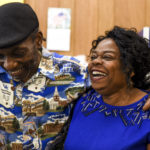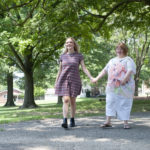Live into it.
According to the life plan I mapped out one day in middle school, when my 20s were but a distant dream, I should be married by now.
Well, that hasn’t happened.
And although my ideas have grown and shifted and changed, this self-imposed relationship timeline is apparently subconsciously ingrained somewhere deep inside me, because it has often upset my contentment and desire to be grateful. Being single, after all, has allowed other deeply good things into my life that I never planned for or imagined could happen to or through me.
Being single is, I imagine, much like being married: some days you wake up over-the-moon about your current state in life, and some days you wake up wondering what the heck you’re doing with your life. (And some days in between, it’s just what you do.) It’s the persevering through that counts.
Singlehood, like marriage, is a means of working out who we are going to be, of being refined and becoming. Both of these life vocations are process-oriented, because they are ways of living life, and life is a process. We are works in progress.
But, still. If one wants to be married or in a romantic relationship, it is hard when it’s not happening. Especially when it feels like it’s what you’re supposed to be doing, either because external standards tell you to or because you genuinely want to be married. And society always holds double standards: at the same time it devalues marriage, it also often seems to more fully accept women who are in relationships.
Marriage, though, is a gift, not a right. It is not the default; it’s a joining of oneself to another to help each other through life. It is, from what I’ve observed and heard, hard.
Singleness, too, is a gift. It’s also a way of joining oneself to others or to a cause to help people through life. And yep, it’s also hard.
Like marriage, I don’t think singleness is a gift to be spent on oneself. Free time is not some consolation prize for schlepping it out alone. As in marriage, the single life is most full when it is poured out for people or a cause we care deeply about and want to unite ourselves to. It’s a life meant to create. To be open. To love people.
We forget, too, that not long ago, singleness was actually not a viable option for women. This is showcased in Jane Austen’s novel “Pride and Prejudice,” which, on one level, revolves entirely around women in the 1800s securing husbands. The butt of every joke in the novel is the mother, Mrs. Bennet, who is single-mindedly intent on marrying her daughters off.
The novel, cloaked with a feel-good ending, disguises a more dire message: in a not-so-distant past, women had to marry because we were barred from equal access to inheritance, education and the workforce, and therefore could not support ourselves financially. Mrs. Bennet is, perhaps, not so silly by being focused on finding men for each of her daughters to marry; she knows she and her husband are not wealthy and have five daughters who will not be able to inherit what they have or work to support themselves, because their society does not permit it.
By finding them husbands, Mrs. Bennet is ensuring her progeny will be able to sustain themselves after she is gone in the only way available to them: marrying into wealth, or, at least, comfort. Perhaps the readers’ easy dismissal of her as a “silly woman” is just what Austen intended for readers to realize about the expectation that women have to get married. We forget: our ability to choose singlehood or marriage today has been hard-won by our mothers, grandmothers, great-grandmothers and farther back before us.
Marriage is beautiful; so is singlehood. Whether your singlehood is an intentional choice or feels forced upon you right now, live it. Be a woman whose deep integrity guides her actions; refuse to settle or conform to standards and people who do not align with what you know to be true. Be grateful. Be open and have grace and a whole lot of grit.
Perhaps more than anything, keep the faith. Time makes everything what it needs to be.

